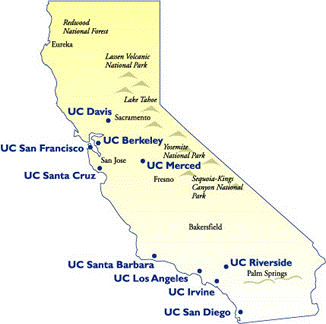Transferring to a UC

www.universityofcalifornia.edu
UC temporarily eases admissions requirements in response to educational disruptions.
UC's response on admissions to COVID-19.
How to Fill Out an Application
UC TAG Application Help
UC Application Help
UC Personal Insight Questionaire
About the UC System
- 10 campuses
- Approximately 220,000 students
- Provides exciting environments that foster world-class educational and research opportunities and generate a wide range of benefits and services that touch the lives of Californians every day
- Emphasizes research, theory and graduate studies
- Manages three U.S. Department of Energy national laboratories
- Five medical centers support the clinical teaching programs of the University's medical and health sciences schools
- Undergraduate and advanced graduate instruction is offered in sciences, the applied fields, and the professions
Learn more about the individual UC campuses and and find a UC campus that's right for you.
Minimum UC Admissions Requirements
In order to qualify as an upper-division (junior-level) transfer to UC, students must meet the following requirements:
- Complete 60.0 units of UC transferable coursework;
- Of the 60.0 transferable units, no more than 14.0 units may be taken for Pass/No Pass grades;
- Earn a minimum 2.40 GPA in all UC transferable coursework (2.80 for CA non-residents);
- Complete the following course pattern requirements with a grade of "C" or better in
each course;
- Two transferable college courses in English composition;
- One transferable college course in mathematical concepts and quantitative reasoning;
- Four transferable courses chosen from at least two of the following subject areas:
- Arts and humanities
- Social and behavioral sciences
- Physical and biological sciences
- Be in good standing and eligible to reenroll at the college you attend prior to transfer.
General Education (GE)
Students have two options for completing GE in preparation for transfer to UC. The first option is the UC Transfer Admissions Eligibility Course List. These are the minimum general education requirements needed for UC admission.
The second option is the Intersegmental General Education Transfer Curriculum (IGETC). IGETC is not recommended for students who choose majors with substantial lower division prerequisites, such as engineering or science.
GE Certification
The certification of GE is the official notification from Community Colleges verifying that a transfer student has completed courses satisfying lower-division general education requirements.
- It is separate from a student transcript.
- Students must complete the General Education Certification Request Form.
- Mission College completes certification for IGETC
Major Preparation
Major preparation is a very important component of the admissions decision for the UC campuses. It is important to know what requirements you have to fulfill in order to transfer into a major at a UC campus. Students that wish to prepare for one major at multiple UC campuses are encouraged to review the Transfer Pathway for their chosen field. Students are advised to complete as much of the lower-division major preparation courses for their program as possible.
Find out which UC campuses offer a degree in your major.
Consult the official articulation agreements between the UC campuses and Mission College at ASSIST to confirm courses that will meet the major preparation requirements.
Impaction
Majors designated as highly selective receive many more qualified applicants than there are spaces available. The stronger your major preparation, the more competitive you will be for these slots.
Learn more about additional program requirements needed for highly selective programs at each UC.
Review Transfer Student Profiles to learn about the academic qualifications of applicants and admitted transfer students to each UC campus.
Cost of Attendance
The estimated average costs for California residents to attend a UC campus for the 2018 – 2019 academic year are $32,400 for students living off campus and $35,300 for students living on campus. These totals include tuition, books and supplies, health insurance fees, room and board, personal expenses, and transportation. California residents at all UC campuses pay the same tuition and fees which are $13,900 for 2018 -2019.
The estimated average costs for nonresidents to attend a UC campus for the 2018 – 2019 academic year are $61,400 for students living off campus and $64,300 for students living on campus. Nonresident undergraduates pay an additional $42,900 in tuition and other fees.
Special Admissions Programs
TAG
Transfer Admission Guarantee (TAG)
Six UC campuses offer guaranteed admission to California community college students who meet specific requirements. By participating in a TAG program, students receive early review of their academic records, early admission notification and specific guidance about major preparation and general education coursework.
The following UC campuses participate in the TAG Program.
- UC Davis
- UC Irvine
- UC Merced
- UC Riverside
- UC Santa Barbara
- UC Santa Cruz
Apply to a UC
To apply to a UC campus, students must complete an online application form and answer the required Personal Insight Questions.
Standard Application Dates:
Fall: Start working on your application on August 1 and submit it by November 30
Winter quarter/ Spring semester: July 1 – 31
Application Fees
The application fee is $70 for each UC campus to which you apply. You must include the fees with your application or it will not be processed.

